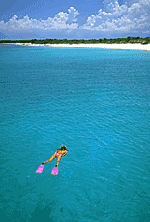Beach and Bathing

On the Beach
Walking barefoot in the tropics entails exposing yourself to a risk for parasites and yeast infections. This also applies to the beach. Therefore, you should use sandals or bathing shoes and do not lie directly on the sand - use a beach chair or a large beach towel.
In the Sea
In terms of swimming, sea water is often clean and due to the high salt concentration, the risk of infection is very small. On the other hand, rivers can be heavily contaminated and should of course be avoided. Swimming in the sea should therefore be done some distance from the estuary.
If you have sensitive skin and easily get skin irritations, it might be appropriate to shower off the salt water.
Remember that many unnecessary accidents have occurred due to combining swimming and alcohol!
Undertows along the beaches can be very strong and there are seldom signs warning of these. Therefore, never swim alone and always stay close to the beach!
There are other dangers lurking under the surface in tropical waters. Most common are them are sea urchins whose barbs are very unpleasant to step on. Corals can be very sharp. Therefore, you should use swim shoes.
Underwater life in connection with diving offers some fantastic fauna. If you plan to dive in tropical water, first get in touch with the local population to find out if there are any poisonous species, e.g., lion fish, stone fish, scorpion fish, and what they look like.
At the Swimming Pool
If you sense the smell of chlorine, then the water if most often clean enough for swimming. Never leave child unattended near a swimming pool!.
In Fresh Water
Schistosomiasis is a disease caused by a parasite that lives in waterways in the tropics. The parasite can burrow in through the skin, cause fever and, in the worse cases, chronic problems in the bladder and intestine. Therefore, avoid bathing, walking barefoot or washing yourself in such water. Confine your water activities instead to chlorinated swimming pools or sea water.
